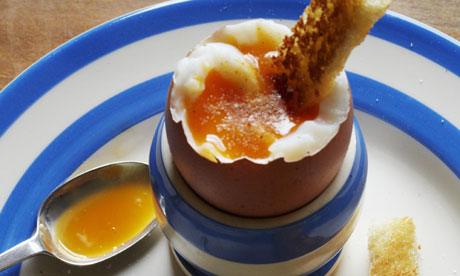
As a six year old I recall being fascinated while watching my paternal grandfather prepare his boiled egg. He would gently, repeatedly, tap his egg with the back of a teaspoon and the shell would star into such minuscule fragments that he was able to remove the fragile bald pate in just the one go. This then neatly revealed the smoothest white dome – the fat end – ready for the spoon to spoil.
It always oozed and wobbled, perfectly, the inside of that egg. In fact, the golden yolk would, occasionally, overflow the crest of the broken shell, all sticky down the blue-striped egg cup as it dribbled.
His final task was to carefully mix together salt and white pepper, ready ground, naturally, in a weeny heap on the side of his plate, so to perfectly season each mouthful.
For those who have always considered me to be something of a pedant, now you know where it may have started. To be frank, spending a small part of one's life perfecting the cooking and eating of a morning egg is, for me, high on the list of good things to do. Far more important than sex. And texting.
There are, for me, three ways to eat a boiled egg: a runny-yolked one for breakfast; a not-quite-so-runny-yolked one but with a firmly set white; and a boiled egg for slicing, or to be chopped and added to mayonnaise as a sandwich filling – particularly good when seasoned with anchovy. And that's it. But to achieve perfection, the following cooking methods should be strictly adhered to.
When buying eggs I ruthlessly rummage to the very back of the supermarket display to find the latest date possible. It is also well worth saying here, that the best and freshest store-bought eggs I have found are those from Clarence Court (clarencecourt.co.uk), available from Waitrose.
The perfect eggs
I firmly believe that to bring an egg up to an obvious simmer, not a full boil, from cold water produces the finest texture of both yolk and white. The pan used should have a thin base if cooking on a gas flame, or if on a flat, electric heat, the pan must have a perfect contact with the source, for the faster the water heats up, the more efficient the timing.
To aid speed, the pan should be covered, and I have always favoured a rather cheap one with a glass lid, enabling a beady eye on optimum simmer. The eggs used here are medium-sized, 60-65g, and always at room temperature.
For a morning egg with a just-set white and runny yolk throughout, once the water is simmering, switch off the heat, leave the lid intact and leave in the water for 1 minute. Lift out with a spoon and put in an egg cup. Eat at once, with soldiers.
For an egg with a firmer white and semi-runny yolk, leave for 2 minutes. For an egg with firm white and slightly firmer yolk – yet still soft-textured – 3 minutes. Four minutes is a perfect egg to be quartered, or sliced, in a Sunday evening lettuce salad, say, or as an egg mayonnaise. And 5 minutes, for me, is as long as I need a hard-boiled egg to be cooked: the yolk is just firm and, once cold, will easily peel at a picnic.
The ideal soldiers
A word regarding soldiers. When a perfect soldier is dunked into the running yolk of a perfectly boiled egg, it needs to be ramrod straight. To achieve this, it is important to employ the correct bread.
I always use the French pain de mie. This has a soft crumb, almost en route to brioche, but less rich. It crisps beautifully, but particularly so when enriched with a little butter before toasting; and by that, I mean almost fried. To achieve this, very lightly brush a thick slice of pain de mie with finest, unsalted, melted butter. Now, moderately heat a solid, non-stick frying pan, place the bread in the pan, butter-side down, and turn the heat down even lower.
While the bread is colouring underneath, carefully brush the top side with more butter. When golden beneath, flip the slice over and repeat the process. Once both sides are equally gilded and super-crisp, slice into 1.5cm fingers.
Note: a slow and quiet care taken with the cooking will, eventually, produce the most crisp of dinky soldiers.
• To buy Simon Hopkinson's The Good Cook for the special price of £18, go to Guardian Bookshop

